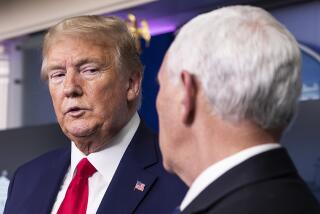Believes He Could Have Prevented Scandal : McFarlane Blames Self for Iran Affair
- Share via
WASHINGTON — Former National Security Adviser Robert C. McFarlane, recently released from the hospital after an apparent suicide attempt, said Saturday that he blames himself for much of the Iran- contra affair and feels he probably could have prevented the scandal had he not left President Reagan’s staff in late 1985.
These regrets--combined with a feeling he was being “hung out to dry” by his enemies at the White House--apparently prompted the former presidential aide to swallow an overdose of Valium on Feb. 9 in what police described as an attempted suicide, according to sources close to McFarlane.
In an interview with National Public Radio, McFarlane, still a Reagan loyalist, also indicated he feels regret that he previously was unaware of some activities of his former aide, Lt. Col. Oliver L. North, until he read about them last week in the Tower Commission report.
‘I Feel a Responsibility’
“I was there, I was in charge of a staff, and it is my responsibility to accept,” he said. “I feel a responsibility for certain of these problems. I think that I shouldn’t make any effort to fob that off on the President. The President’s purposes, intentions were clearly positive and I think supportable by the American people.”
McFarlane said he left the White House in December, 1985, because the President “did not look to me directly” for foreign policy advice, but relied more heavily on Secretary of State George P. Shultz and Defense Secretary Caspar W. Weinberger. In addition, he acknowledged that he departed because he and then-White House Chief of Staff Donald T. Regan were often at odds.
While it appeared to him at the time “that my departure would not be catastrophic,” he now thinks he was wrong to leave.
“I do feel bad about that now,” he said in the NPR interview. “I believe I could have changed the course of events if I’d stayed. I guess I do feel in retrospect . . . that I should have stayed on, because if I had stayed on, I might have been able to prevent some of these things.”
Defends President
He also defended Reagan’s inability to remember whether he approved an Israeli shipment of weapons to Iran in late 1985--even though McFarlane himself insists that it was done with the President’s explicit approval.
Although no one outside McFarlane’s family has read the note he left at the time of his overdose, sources said McFarlane was upset about reports that the President would give testimony contradicting his own about his approval of the shipment. These sources added that he also thought his old nemesis, Regan, was spreading rumors laying most of the blame for the scandal on him.
McFarlane acknowledged in the interview what sources have previously said was another reason for his apparent suicide attempt--a feeling his career had been ruined by the scandal. He said he hoped to return to government service someday, but feared it was unlikely.
“I love government,” he said.
McFarlane added that until he read the Tower Commission report, he was unaware of Project Democracy, the program to aid the Nicaraguan rebels that North launched from the White House in 1985.
Diversion of Funds
“It looks as though there may have been things that I didn’t know about that I should have, and I’m still responsible,” he said.
He confirmed that he suggested to North on their return from Tehran last May that North check himself into Bethesda Naval Medical Center. It was during that trip that McFarlane learned from North that money from the Iranian arms sales was being diverted to the Nicaraguan rebels.
“In my brief four-day exposure to Col. North on the trip, it was apparent that he was working beyond the point of exhaustion,” he said. “I don’t imply a judgment on that as to his activities, because I think he was devoted to doing what the President wanted done.”
More to Read
Sign up for Essential California
The most important California stories and recommendations in your inbox every morning.
You may occasionally receive promotional content from the Los Angeles Times.













